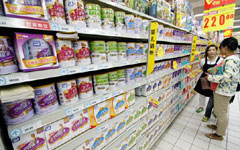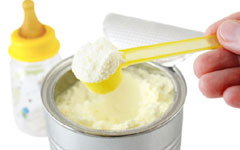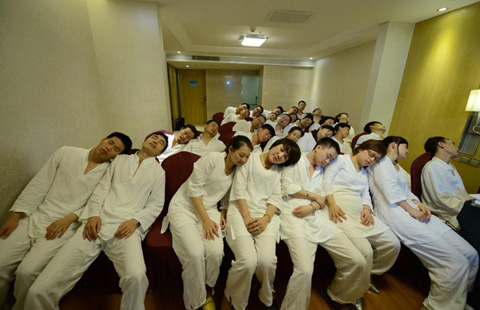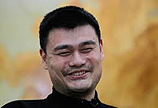Foreign, local dairies to milk profits from smaller industry
By Wang Zhuoqiong (China Daily) Updated: 2014-05-28 06:56The recent move has encouraged major foreign OEM providers to take initiatives to cut some smaller brands and to consolidate their portfolios, Song said.
There are about 8,800 registered domestic and foreign infant milk brands in China, and the new rules are likely to push half the foreign brands, but only 10 percent of the market value, off Chinese shelves, he said.
 |
|
 |
Sales of imported milk powder in China rose by 79.3 percent in the first two months of 2014 compared with a year ago. Foreign companies made up 54 percent of the Chinese market in terms of sales revenue in 2013, according to Global Intelligence Alliance.
The dairy regulations will give both foreign and local brands a chance to capture market share. Foreign companies, known for their quality assurance, will be able to leverage the current demand for their products. Local companies will be able to build on their relationships with local distributors, suppliers and logistical operators to lay claim to the newly available shelf space, said Nicolas Pechet, senior vice-president of Global Intelligence Alliance China.
For the time being, the memory of the 2008 melamine incidents in China are helping to bolster Chinese consumers' preference for foreign brands. The dairy market is being driven by brand confidence, and the new regulations do not address that, Pechet said.
Leng from Feihe Dairy said it will take time to regain Chinese consumers' faith in domestic dairy enterprises, but efforts to improve and ensure product quality should win them over.
- China can walk and chew at the same time
- RRR cut unlikely: economists
- Lamborghini Gallery Held in Hong Kong, China
- English education app testing waters in China
- Govt seeks to ease small companies' fee burden
- Power supplier will seek private capital
- UnionPay to spend $32m on online payment
- Foreign, local dairies to milk profits from smaller industry
















